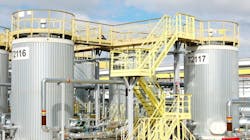Shell to sever all relations with Russian oil and gas industry
In the wake of its late-February plan to exit equity partnerships held with PJSC Gazprom entities, Shell PLC says it is now undertaking a complete but phased withdrawal from all Russian-related oil and gas activities amid the Russian government’s war in Ukraine (OGJ Online, Feb. 28, 2022).
Shell now intends to withdraw from its involvement in all Russian hydrocarbons, including crude oil, petroleum products, gas, and LNG in a phased manner, aligned with new government guidance, the operator said on Mar. 8.
As an immediate first step, Shell said it will stop all spot purchases of Russian crude oil, as well as shutter its other businesses in Russia, including service stations, aviation fuels, and lubricants operations.
“We are acutely aware that our decision last week to purchase a cargo of Russian crude oil to be refined into products like petrol and diesel—despite being made with security of supplies at the forefront of our thinking—was not the right one, and we are sorry,” said Ben van Beurden, Shell’s chief executive officer.
“As we have already said, we will commit profits from the limited, remaining amounts of Russian oil we will process to a dedicated fund [and] work with aid partners and humanitarian agencies over the coming days and weeks to determine where the monies from this fund are best placed to alleviate the terrible consequences that this war is having on the people of Ukraine,” van Beurden said.
The operator’s intensified exit plan from Russia comes in the wake of Mar. 8 threats by Russia to stop pipeline flows to Europe, further complicating the difficult choices and potential consequences Shell faces in undertaking the withdrawal, according to van Beurden.
Unless otherwise directed by governments, Shell said it will:
- Immediately stop buying Russian crude oil on the spot market, as well as not renew existing crude purchase term contracts.
- Change its crude supply chain as fast as possible to remove Russian volumes entirely, with the caveat the physical location and availability of alternatives means this could take weeks to complete and will lead to reduced throughput at some of its refineries.
- Immediately begin the process of safely shuttering its service stations, aviation fuels, and lubricants operations in Russia.
- Begin the complex challenge of starting its phased withdrawal from Russian petroleum products, pipeline gas, and LNG businesses in a process that will require concerted action by governments, energy suppliers, and customers. The transition to other energy supplies, however, will take much longer, the operator warned.
“[While these] societal challenges highlight the dilemma between putting pressure on the Russian government over its atrocities in Ukraine and ensuring stable, secure energy supplies across Europe… ultimately, it is for governments to decide on the incredibly difficult trade-offs that must be made during the war in Ukraine,” said van Beurden.
Despite the challenges, van Beurden reiterated that Shell will continue to work with all governments involved to help manage potential impacts on the security of energy supplies, particularly in Europe.
Currently one of the largest direct foreign investors in the Russian economy, Shell’s businesses in Russia include exploration, production and transportation of oil and gas; sale and distribution of petroleum products and petrochemicals, lubricants, motor, and industrial oils; a retail network of gas station; as well as provision of technological and consulting services to Russian enterprises, according to the operator’s Russian-language website.
While detailed information regarding Shell’s downstream holdings in Russia are not readily discoverable, the company does operate a 180,000-tonnes/year lubricants production plant in Torzhok, Tver Region, according to the website.
About the Author
Robert Brelsford
Downstream Editor
Robert Brelsford joined Oil & Gas Journal in October 2013 as downstream technology editor after 8 years as a crude oil price and news reporter on spot crude transactions at the US Gulf Coast, West Coast, Canadian, and Latin American markets. He holds a BA (2000) in English from Rice University and an MS (2003) in education and social policy from Northwestern University.

